Bobby Epperson's Blog, page 2
June 3, 2017
There's No Time ...
Maybe you thought I would complete the phrase by adding, ". . . like the present." Nope, I simply just want to express that there is no time. I'm not gonna try to be Einsteinian or something and say that time is an illusion because I'm not at that level of perception. However, whenever you plan for the future, you're making an assumption that the time will be there. It's pure imagination. The time that you think will be there for you doesn't actually exist. It's only a flimsy thought in your head.
And here you may be thinking, "Robert's going to get all cliche on us again. He'll dive right into some banal truth like Live life to the fullest or Live each day like it's your last." Nope, but I will say that there's a lot of truth here:
Hope for the best and prepare for the worst.The worst could very well happen. Why? Because there's no time. What is perceived as the worst is only a perception of limited time, i.e. time is only hope. It is a construct of projecting hope into the future. Disaster and calamity bring us full force back into the present moment, where, by putting one foot in front of the other, we move through adversity. Wonder why depressed, hopeless people kill themselves? Because they do not have the tools to create time for themselves. Therefore, they experience only an agonizing present moment of despair.
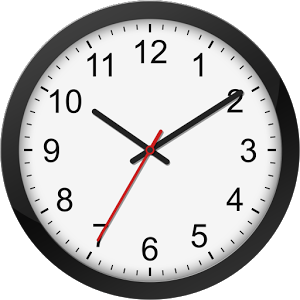
play.google.com
When you hope for the best, you mentally create your future. Yet the worst will rob you of that, and when it does, the only hope you'll be left with is that you had done something to prepare you for present pain robbing you of future gain. Then you'll be tempted to live in the past and to wish that some different action had been taken to affect a different outcome. And then what do you do? If you are able, all you can do is:
Weather the worst by hoping that present action will lead to the creation of time.You have to learn to put hope in what you are doing right now. And now. And now. As you do that, the hope will grow. Hope will create more hope, an expansion of time. If you think you have all the time in the world, you may be tempted to sit back and do nothing in the present. Again, an illusion of time. Likewise, if something terrible happens to you, you may get stuck in the past, trying to figure out how things in the present might have been different. You'll be too caught up in what was to do anything about what is. More sitting back and doing nothing. Not only is there no time like the present, there's no time in anything but the present.
Time really is a relative thing. It does not exist out in the world. It is a product of our circumstances, our action or inaction. Time is only action and how that action is perceived by you. Does the action give you hope or does it steal your joy?
You'll only create action through action, so in the present moment, be mindful of what you want to create. Take a step that you hope will bring about an action that you will respond positively to. If something great happens, you'll link your steps together and find a pattern of progressing time (and hope), which you'll be tempted to project into the future. If something destructive happens, you'll think back to the past and try to figure out what went wrong as time collapses on itself and forces you to be present..
A present regret is a present past.
A present hope is a present future.
A present action is a regretted hope, a hoped regret, the birth of time, yet no time at all.
May 30, 2017
Book Review: An Unquiet Mind by Kay Redfield Jamison
As a manic-depressive (bipolar) myself, I can't believe it's taken me almost nine years since my diagnosis to read An Unquiet Mind: A Memoir of Moods and Madness by Kay Redfield Jamison. However, I'm glad that I had a longer-term perspective on my illness upon reading because some of Jamison's most poignant passages simply wouldn't have been so impactful.
The memoir makes it clear that Jamison is highly educated, brilliant, and talented in the field of clinical psychology in addition to being someone whose intense suffering—combined with top-rate writing skills—explores, sometimes poetically, the depths of what it means to be bipolar, such as tolerating a less mercurial and more monotonous, rote existence; integrating a diagnosis into one's identity, including dealing with shame in the aftermath of manic sprees; and even having children, potentially passing on the disorder, of which Jamison wrote:
Oddly enough, it had never occurred to me to not have children simply because I had manic-depressive illness. Even in my blackest depressions, I never regretted having been born. It is true that I wanted to die, but that is peculiarly different from regretting having been born.
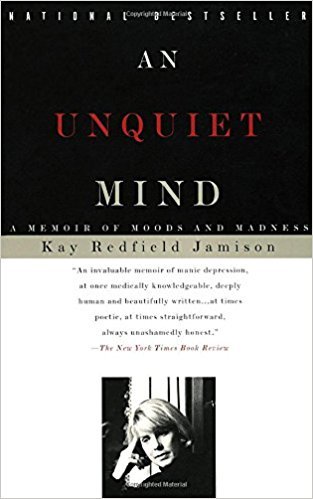
amazon.com
I really wish I could get my family members to read this so that they might grasp the sheer magnitude of the existential questions that the manic-depressive faces. The "poles" of bipolar truly push people like me to the outer brinks of the human experience, whether withered up and dead inside or alive with intense light that mistakes itself for an upgrade to one's operating system through amplified senses, quickness of mind, flirtation with danger, and spiritual awakening. That is until the euphoria—if one is so lucky to not be consumed by blackness from the outset—coalesces into sheer terror, seemingly demonic hallucinations, and a wicked carnival ride that won't stop until it crashes in burning fury.
Jamison, though very ill, has gone on to make great contributions in her career. She has undoubtedly been tremendously strong to have yet still achieved so much, and she gives great hope for the future to people like me. I'm giving An Unquiet Mind five stars. Although Jamison somewhat veered off the topic when she got into the history of her romances (nonetheless demonstrating the power of love amid such a tough illness), the way she captured manic-depression was one that I have not found thus far, and for me to know that others like me are grappling with the same challenges is invaluable. I'll leave with a word from Jamison on the power of love in living with bipolar:
No amount of love can cure madness or unblacken one's dark moods. Love can help, it can make the pain more tolerable, but, always, one is beholden to medication that may or may not always work and may or may not be bearable. Madness, on the other hand, most certainly can, and often does, kill love through its mistrustfulness, unrelenting pessimism, discontents, erratic behavior, and, especially though its savage moods. The sadder, sleepier, slower, and less volatile depressions are more intuitively and more easily taken in stride. A quiet melancholy is neither threatening nor beyond ordinary comprehension; an angry, violent, vexatious despair is both. Experience and love have, over much time, taught [my husband and I] a great deal about dealing with manic-depressive illness; I occasionally laugh and tell him that his imperturbability is worth three hundred milligrams of lithium a day to me, and it is probably true.
Give this book a read, and if you suffer from bipolar, get at least one person in your life whom you can talk to regularly, even if that's a psychologist or counselor. The importance of having some type of support network cannot be overstated, and I, like Jamison, believe that a solid connection with someone is just as valuable as medication.
February 26, 2017
What should a warrior do?
I had a book on my shelf that had been read halfway through, and I finished it last night. It's called Warrior of the Light by Paulo Coelho. The book is a collection of very valuable teachings, each no more than a page in length, and addresses how to be victorious in your life. I'd like to share one in particular:
The Warrior of the Light hears comments like: "There are certain things I'd rather not talk about because people are so envious."
When he hears this, the Warrior laughs. Envy cannot harm you, if you don't let it. Envy is part of life and everyone should learn to deal with it.
However, he rarely discusses his plans. And sometimes people believe this is because he is afraid of envy.
But he knows that whenever he talks about a dream, he uses a little bit of energy from that dream in order to do so. And by talking, he runs the risk of spending all the energy he needs to put the dream into action.
A Warrior of the Light knows the power of words.
I selected this passage because I often feel this way: I have some big idea about where I want my life to go, or of some major plans that I've made, but I try not to talk about it. I'm not saying I'm a Warrior of the Light, but maybe I am. However, one reason I don't talk about my plans is because I don't want someone to hold it over my head if those plans fail somehow. There's a part of me that knows that my dreams are for me and no one else—not for another person's expectations or wishes about me and what I should achieve.
Let's look at that word, should. In Cognitive Behavioral Therapy (CBT), a "should-statement" is one of many types of negative statements. (CBT teaches us that repeating these negative statements as a form of self-talk is destructive to our mental well-being and therefore our behaviors.) Should is a word that would best not be in your vocabulary when referring to yourself, as in "I should apply for that job, but . . ." or "I should have never married my spouse because . . ." Statements like these open you up to a massive amount of self-criticism. After all, a should-statement basically charges you with having to conduct life in a different way to achieve a different result, whether in the past or the future. You certainly can't change the past, but you can have dreams for the future, not dreams that you should do, but dreams that you can and will do if you work hard enough.
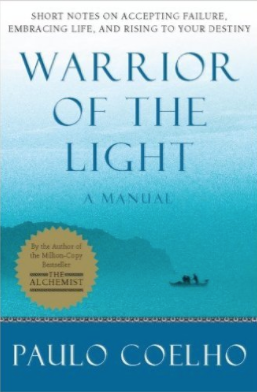
amazon.com
Think about it like this: the only things that should happen in the world are ones that are scientifically proven. For example, if I drop an apple, it should fall down to the floor. If, given that my laptop is reliable, I press certain keys, I should be able to construct the words and sentences I want. Along your path to achieving what you can achieve, there may be things that you should expect to work out for you. If you're in grad school and you spend countless hours studying, preparing papers, and reading, you should expect to do well in your course. The key is to make should your friend instead of your enemy.
Why pay so much attention to words? Because you, Warrior of the Light, know their power. Don't invite should into your life, and keep your plans to yourself so that others don't put their shoulds upon you. Remember that, above all, for certain inputs of time, energy, work, and creativity, you should expect to see the results you're going after. If you're not getting the results you think you should, you have plenty of work left to do.
Good luck.
Open Your Ears to Media Fears
I want to take you back in time to the era of your grandparents. It was the 1920s, and, according to history.com, for the first time in American history, more people lived in cities than in rural areas. And what we know as modern mass culture was birthed. From sea to shining sea, Americans listened to the same music, danced the same dances, and purchased the same goods. It was the homogenization of a nation.
Advertising played a large part in the cultural shift of the 1920s, and advertising has continued to greatly influence the national zeitgeist, or mood of the country. Our programming has become increasingly and deeply psychological, and if we see it for what it is, we can avoid being played by the system.
While advertising today has its roots in 1880s industrial expansion (eyewitnesshistory.com), the voice of ads seemed to shift after World War I, just on the cusp of the 20s. Take Coca-Cola for example:
When first introduced in the 1880s, [Coca-Cola] was marketed as a medicine, with claims that it cured headaches, and that it "revived and sustained" a person. Seeking to build repeat business and brand loyalty, by the 1920s the company emphasized it as a refreshment and a "fun food".
What’s interesting here is that advertising changed its game after a major war. In the case of Coca-Cola, the messaging shifted: where benefits to the body were once touted, now the feel-good experiences of the mind (psychology) took center stage. This is an example of the type of advertising that began to emerge as a result of the US government’s “first official foray” into creating propaganda during World War I (pbs.org).
Sure, there are plenty of products and companies that still today employ feel-good sales tactics and brand messaging. But if you’re anything like me, you may have also noticed that psychologically driven advertising has quite a darker side. In fact, another war—WWII—is responsible for this dark shift.

reaperswargaming.co.uk
Hitler's systematic murder of millions of Jews was a very dark atrocity. And so was Hitler’s propaganda. In response to Third Reich advertising, however, American propaganda began to take on a more sinister tone. Why not disseminate the same psychological manipulation to US consumers? After all, countrymen needed to be convinced of the great horrors of Nazism (and the great majesty of patriotism!), and that happened by appealing to more personal convictions, such as identity, hopes, dreams, fears, pride, prejudice, and so on.
And here now we stand with the modern state of American advertising/ propaganda. The latest propaganda I have been receiving is from Trump, who decries how “fake” news media is. In such a declaration, we have now been opened up to the possibility that we cannot even know what’s true. Whereas propaganda can be used to appeal to or plant a “truth” in us (think WWII variety), the very question of what is real or not seems to be up for grabs. Trump's statements, however, are but expected rhetoric for a president who aspires to absolute power and says, “You can trust nothing, but you can trust me.”
The big lesson here is that you must separate your values from your media. Think for yourself, and stoically observe how others are trying to sway you. Most of the messaging coming to you is a game to win your loyalty. If you know what you stand for, you will know where to place that loyalty, but if you are searching for meaning in life, you will be pandered to and given a meaning—not usually for some altruistic purpose but to convince you that your vote, whether with a ballot of a wallet, counts for something.
Finally, think about this statement of mine:
There is a fine line between a cult member and someone who rushes out to buy a Big Mac after seeing a McDonald’s commercial.
It's true to me. Both persons use messaging to construct meaning that inspires their actions, although, you may argue, on different scales.
And with that, friends, be mindful and remember: Winston tastes good like a cigarette should!
February 23, 2017
Getting Started is the Hardest Part
I've been known to procrastinate just as much as the next guy, when when I dig in and get to business, I eventually pass that first major hurdle and enter into easier territory. This principle applies to most everything that you, too, will do—from work projects to studying to starting a new diet or exercise program.
But why is there often so much sluggishness and hesitation surrounding new beginnings? In short, it's all about your expectations.
I remember back in my younger days when I was a lot worse at procrastinating. I would take on a school project, but there was just so much to do. I could envision all of the many details that would have to go into a successful masterpiece, and so I did nothing. I was overwhelmed by the work that lay ahead because it had no form and no shape. I didn't understand how, in its nebulous being, I was to transform blurry nothingness into a real (and really awesome) final product.
And that is why you have to make the first step. In the realm of possibility, you must add constraints before creation can take place within those constraints. It doesn't matter what you do, just do something.
When I wrote my book, I had no idea my writing would even become a book. I set out to write a scene about when I broke out of a mental hospital (spoiler). I knew that that piece could be a climax to the story, and so then I began writing other scenes (just the ones that stood out to me the most), and a framework for a full manuscript began building.
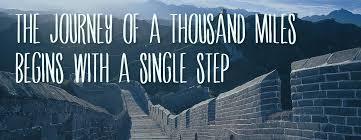
journeyof1000miles.org
Some of you may already get the full point of this blog post (as though my super-cliche photo didn't absolutely give it away), and I wasn't trying to astonish you with my wealth of experience and knowledge. In fact, the very point of this writing came about because I had to force myself to sit down and crank out a blog. Is this the most though-provoking piece in the world? Of course not, but the point is that I did something. I—one keystroke at a time—made you read this, which is a hell of a lot better than chain-smoking cheap cigars in my kitchen while I lament all the work waiting for me at the office.
I will get to that work. And you will get to yours. You will not think about how much is to be done, but you will see that the only way to cut down on your to-do list is, well, to do something, no matter how small. If you're overwhelmed by training for a 5k, don't set out to run a 5k. Maybe all you can do is run a mile. Or a half mile. Or walk around the block. The point is, it's all progress—maybe not progress on the timescale that you want, but if you persevere and get over that first hurdle, things will get easier. Soon you'll be jogging around then block, then around two or three. Or maybe your workload will begin reducing because you're spending time tackling real tasks instead of checking Facebook.
And as far as those creative pursuits go, remember that everything starts as a rough draft. Get those ideas out of your head first, and then go back and revise, revise, revise until your creation most accurately reflects that initial dream you had for it, that dream that was so big yet so undefined. It could only become defined through your every small step toward it.
So don't be afraid of fucking up. Don't spin your wheels. Don't think, just do. Getting started is the hardest part, but once you've created momentum, you'll be flying toward a life that's more fulfilling. Trust me. Now, please, for the love of progress, go do what you've been putting off.
Good luck.
February 18, 2017
Elitist Diversity-of-Opinion & Trump
Shooting from the hip here. This may be poorly written (and read like a high school English paper) and contain factual errors and over-generalizations, the point being my viewpoint—while perhaps not "perfect" or politically correct—is still valid.
I think we're living in a time where diversity of viewpoint and opinion is being severely eroded. For example, Facebook users can curate their audience to attempt to include only friends whose views are acceptable or likeminded. Opinions that deviate from a person's Political Correctness can easy be deleted, or the source of those opinions can be de-friended. The problem I find with this mentality (which doesn't have to apply specifically to social media and has crossovers into real-world interactions) is that those deemed "ignorant" are not given a chance to be lifted up by more worldly viewpoints.
An error of assumption is that because a person exhibits ignorance, that person is also close-minded. However, the "ignorant" subject has no choice but to communicate from his or her unique perspective. He or she may do so with the honest intent of being enlightened—of being met with a viewpoint that will sway him or her toward an elevated understanding of a particular issue. And that's the most that we can ask of an individual. But if contrasting viewpoints are not playing off one another toward an end-goal of education and understanding, the grassroots conversation underpinning democracy ceases to evolve in a healthy way.
Speaking authentically is a key to upholding democracy. Otherwise, how can true consensus be gained? If a person were to merely "talk the talk" in order to gain favor with PC consensus, his or her honest understanding of a subject, however ignorant, would not be fairly represented. And that's what we see happening in the social world. The idea is that if the viewpoint of the ignorant can simply be ignored or silenced, then that viewpoint will cease to have meaning in society. Ironically, in doing so, the more politically-aligned have themselves become ignorant as a result of shutting out knowledge. (The perspectives of the less educated or less informed remain a valuable source of knowledge irrespective of their standing on a tolerance scale.)

A truly healthy American society evolves in what I call "deltas of confluence." These deltas are where various cultures and perspectives brush upon one another and synthesize a novel solution—a new language—that integrates multiple people and their viewpoints. Although we live in a largely digital world, I think of physically translated deltas of confluence to be well-exemplified by the city of New Orleans, a place intermingled by the French, Spanish, and African Americans (not an all-inclusive list), which gave rise to a Creole culture that I find incredibly fascinating, injustices notwithstanding.
If we want to make a country that's uniquely American, it's imperative that we allow for deltas of confluence to abound, places where the dynamics of multiple cultures and points-of-view can play off one another in the creation of something amazingly novel and uniquely American. Shutting down the "ignorant" and barring them from benefitting from the point-of-view of a curator is not unprecedented in the least, but it is, in my humble opinion, elitist and counterproductive to the synthesis of a more integrated and healthy society.
I'll give you a final charge. If you want to be a true American, have a conversation with someone who doesn't see eye-to-eye with you, knowing that you'll respect one another no matter the outcome of the banter. Try to persuade a person to your ideals. Allow yourself—with an open and rational mind and a generous heart—to be persuaded yourself and admit, "You know, that's interesting. I'm not sure about that. Can you tell me more?"
Now more than ever, we cannot fight political correctness at the political level with political correctness at the plural level. It's a fight that cannot be won because as sure as the people learn to talk like the politicians, the politicians from which we choose will start to look like Donald Trump and will tilt the language back toward the ignorance that was deliberately shut out by the people who thought themselves the ruling class.
You may, in the case of Donald Trump, claim that only the ignorant will vote for him, but wasn't it the ignorant that you banned from your conversations long before Trump was a candidate?
Millennials Unite!
I don't know how old you are, and I welcome visitors of all ages to my website. However, in keeping with the coming-of-age quality of my book, Robert and the Erupting Brain, I would like to say a word about Millennials, members of my generation whom older people seem to love to hate.
First off, for older Millennials who were in the workforce when the 2008 bank bailout and subsequent Great Recession hit: that shit wasn't easy. I got laid off and had a terrible time finding work again. When I did go back to work, I had to settle for doing something that wasn't directly related to my college degree. Still, I consider myself lucky. I know that there are plenty of you out there who have had to settle for menial jobs despite your qualifications. But hey, at least the over one-trillion dollars in student loan debt is helping prop of the economy. Thanks, Boomers! Way to profit off the younger crowd while your own college education was dirt cheap.
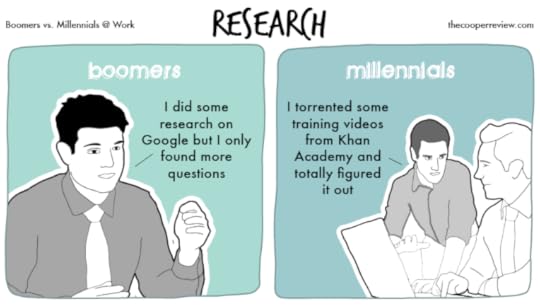
thecooperreview.com
Times are tough and lean, but you can't let go of your dreams. It may be said that you are just a lazy, clueless twit whose smart phone has become a permanent fixture on your body, but I also believe that Millennials are extremely resourceful and can leverage technology and a civic spirit to breathe new life into societal institutions from a grassroots level. Don't wait on someone to hand you a job. Think about creating your own job. Use your qualifications out in the wider world to make a difference that reflects your unique values. Opportunity is there, but maybe instead of looking for it, you can create it. Be lucky. After all, it's been said that luck is a matter of preparation meeting opportunity.
As far as the traditional job market goes, opportunity is on the horizon. Today, 10,000 Baby Boomers will hit the retirement marker age of 65, and 10,000 more will do so every day for the next 19 years (pewresearch.org). This mass exodus of Boomers from the economy is creating a vacuum that will have to be filled with the talent of a qualified individual such as yourself. So while times may be lean now, remember: you and your generational cohorts are coming into power sooner than you might think. Keep aligning yourself on a track to be qualified for the position you want by continuing to learn and create.
Final word: know where you're going, and you will get there. True for Millennials, yes, but also true at any age. Good luck.



